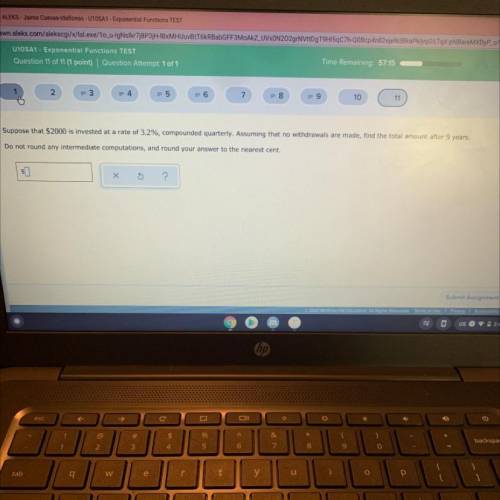
Mathematics, 16.04.2021 22:10 mirandahamamaox89fl
Suppose that $2000 is invested at a rate of 3.2%, compounded quarterly. Assuming that no withdrawals are made, find the total amount after 9 years. Do not round any intermediate computations, and round your answer to the nearest cent.


Answers: 2


Another question on Mathematics

Mathematics, 21.06.2019 16:30
What is true about the dilation? it is a reduction with a scale factor between 0 and 1. it is a reduction with a scale factor greater than 1. it is an enlargement with a scale factor between 0 and 1. it is an enlargement with a scale factor greater than 1.
Answers: 2

Mathematics, 21.06.2019 22:00
If my mom gets $13.05 an hour, and she works from 3: 30 to 10: 45 in the morning, how much money does my mom make?
Answers: 1

Mathematics, 21.06.2019 23:50
Apolynomial has two terms. check all of the factoring methods that should be considered. common factor difference of cubes sum of cubes difference of squares perfect-square trinomial factoring by grouping
Answers: 3

Mathematics, 22.06.2019 00:00
(50 ) mrs. julien’s and mrs. castillejo’s classes are selling cookie dough for a school fundraiser. customers can buy packages of macadamia nut chip cookie dough and packages of triple chocolate cookie dough. mrs. julien’s class sold 25 packages of macadamia nut chip cookie dough and 30 packages of triple chocolate cookie dough for a total of $221.25. mrs. castillejo’s class sold 5 packages of macadamia nut chip cookie dough and 45 packages of triple chocolate cookie dough for a total of $191.25. (a) write the system of equations that model the problem. be sure to explain which equation represents which situation. (b) find the cost of each type of cookie. show your work. (c) explain which method you used to solve the system and why you chose that method.
Answers: 1
You know the right answer?
Suppose that $2000 is invested at a rate of 3.2%, compounded quarterly. Assuming that no withdrawals...
Questions

Mathematics, 24.09.2020 18:01



Mathematics, 24.09.2020 18:01








Mathematics, 24.09.2020 18:01

Mathematics, 24.09.2020 18:01





Mathematics, 24.09.2020 18:01




